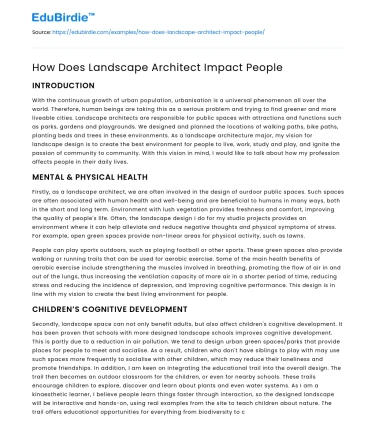INTRODUCTION
With the continuous growth of urban population, urbanisation is a universal phenomenon all over the world. Therefore, human beings are taking this as a serious problem and trying to find greener and more liveable cities. Landscape architects are responsible for public spaces with attractions and functions such as parks, gardens and playgrounds. We designed and planned the locations of walking paths, bike paths, planting beds and trees in these environments. As a landscape architecture major, my vision for landscape design is to create the best environment for people to live, work, study and play, and ignite the passion of community to community. With this vision in mind, I would like to talk about how my profession affects people in their daily lives.
MENTAL & PHYSICAL HEALTH
Firstly, as a landscape architect, we are often involved in the design of ourdoor public spaces. Such spaces are often associated with human health and well-being and are beneficial to humans in many ways, both in the short and long term. Environment with lush vegetation provides freshness and comfort, improving the quality of people's life. Often, the landscape design I do for my studio projects provides an environment where it can help alleviate and reduce negative thoughts and physical symptoms of stress. For example, open green spaces provide non-linear areas for physical activity, such as lawns.
Save your time!
We can take care of your essay
- Proper editing and formatting
- Free revision, title page, and bibliography
- Flexible prices and money-back guarantee
People can play sports outdoors, such as playing football or other sports. These green spaces also provide walking or running trails that can be used for aerobic exercise. Some of the main health benefits of aerobic exercise include strengthening the muscles involved in breathing, promoting the flow of air in and out of the lungs, thus increasing the ventilation capacity of more air in a shorter period of time, reducing stress and reducing the incidence of depression, and improving cognitive performance. This design is in line with my vision to create the best living environment for people.
CHILDREN’S COGNITIVE DEVELOPMENT
Secondly, landscape space can not only benefit adults, but also affect children's cognitive development. It has been proven that schools with more designed landscape schools improves cognitive development. This is partly due to a reduction in air pollution. We tend to design urban green spaces/parks that provide places for people to meet and socialise. As a result, children who don't have siblings to play with may use such spaces more frequently to socialise with other children, which may reduce their loneliness and promote friendships. In addition, I am keen on integrating the educational trail into the overall design. The trail then becomes an outdoor classroom for the children, or even for nearby schools. These trails encourage children to explore, discover and learn about plants and even water systems. As I am a kinaesthetic learner, I believe people learn things faster through interaction, so the designed landscape will be interactive and hands-on, using real examples from the site to teach children about nature. The trail offers educational opportunities for everything from biodiversity to conservation to water quality. From my point of view, this design is not only for fun, but also for educational – this is where 'learning and play' in my vision comes from.
COST
Thirdly, when the owner decides to engage in construction, he must consider the cost of the project. Therefore, at some stage of design development, we may use plans, construction details, and construction specifications to collect the actual cost of installation. In addition to the detailed cost estimates that provide us with value in terms of local economic and market impact, the client also benefits from this service as it validates the project construction budget. This means we are responsible for assessing and meeting the construction costs specified in the client's agreement.
For initial estimates, we usually use a calculation based on floor area. For example, when a plan shows a symbol of shade tree, we indicates the tree's planting cost estimate by determining the exact tree's root ball size, excavation pit size, amount of gravel needed, drainage pipes, soil modifier, mulch, tree stakes, and so on. The cost of materials can be calculated according to the fair value determined by local market factors. In order to reduce future maintenance costs, in the final design phase, we must check that our design of the landscape is sustainable. This means that both plants and trees need to be site-tolerant. Some plants are too delicate to keep in the sun, while others like it very much. Therefore, as landscape architects, we need to study what kind of vegetation can complement the site. We not only design the layout of the spaces, but also have a certain understanding of horticulture.
CONCLUSION
Landscape architect is a profession that encompasses both un-designed and built environments. It involves multidisciplinary design work, including some understanding of soil science, civil engineering, landscape ecology, design aesthetics, horticulture, arboriculture, botany, irrigation system, city planning, traffic planning, environmental issues, drafting, art, etc. We enjoy the process of taking different ideas and produce pieces of artworks – designing and changing in the characteristics of landform for the recreational facility and by planning the effective placement of structures, such as, vehicle and pedestrian paths, planting, earthwork, drainage infrastructure, buildings. Our designs often complement the architect's plans by serving useful, aesthetic, safe and enjoyable purposes.






 Stuck on your essay?
Stuck on your essay?

